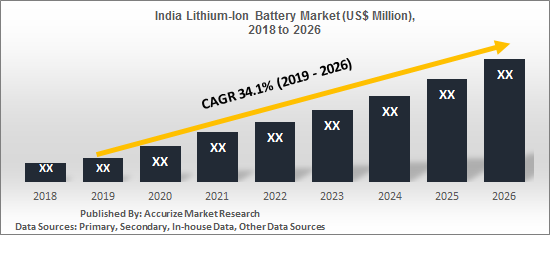India Lithium-Ion Battery Market is projected to foresee significant growth during the forecast period, i.e., a compound annual growth rate (CAGR) of 34.1% from 2019 to 2026. These batteries have the potential to achieve very high energy and power densities in high-density battery applications such as electronics, automotive and standby power. Lithium-ion batteries are having applications across from electric vehicles to portable electronics and energy & natural resources. Increasing adoption of smartphones, wearables, toys, power tools, tablets, payment devices, personal care devices, and digital cameras among users has led to improved demand for lithium-ion batteries in India. Further, lithium-ion battery recycling would emerge as a huge opportunistic market in the coming years as the companies such as Tata Chemicals, Raasi Solar, Mahindra, Toshiba, LG Chem, Suzuki Motor Corporation & Toyota Motor Corporation, Bharat Heavy Electricals Limited, and Adani Group among others are in the foray for locally manufacturing lithium-ion batteries in India. India is a tremendously rising market for electric vehicles (EVs) and this has attracted companies all over the globe to invest in the India market.

Unlike conventional batteries/ lead-acid batteries, lithium-ion batteries do not emit hazardous acids such as sulphuric acid. Also, carbon emissions, depletion of natural resources, and the rising cost of fossil fuels are paving the way for another greener substitute. Therefore, continuous efforts have been taken by both private and public sectors to reduce carbon emissions and save fuel. Strict government regulations related to CO2 emission is driving the global lithium-ion battery market. The rising need for eco-friendly energy storage solutions has driven the demand for such energy storage solutions. As per the study, the government of India had a conversation with 50 companies, both domestic and foreign, to raise investment for electric vehicles and batteries, which would definitely boost the Indian market for lithium-ion batteries in the future years.
The application of lithium-ion batteries is higher in electric vehicles and plug-in hybrid vehicles due to longer life span and high energy density compared to other rechargeable batteries. The number of electric/hybrid vehicles is expected to increase at an exponential rate and are expected to further increase the demand for lithium-ion batteries in the years to come. The above-mentioned facts are expected to boost the demand for lithium-ion batteries in the automotive sector. In addition, increasing pollution and decreasing fossil fuel reserves have elevated government attention towards the use of electric vehicles and plug-in hybrid vehicles. The Indian government is focusing on hybrid vehicles with pure electric drives which would eventually drive the market for lithium-ion batteries.
China has been the major exporter of lithium-ion batteries globally and India doesn’t have any manufacturing plant at present although efforts are being made by a number of companies in this direction. The companies such as the Adani, the JSW, the Mahindra and the Hero groups among others are expected to invest heavily in the manufacturing of lithium-Ion batteries due to its increasing applications primarily across automotive, electronics, and energy sector.
The India lithium-ion battery market has been segmented on the basis of material type and industry vertical. By material type, the market is further segmented into cathode, electrolytic solution, anode, and others (includes binders, separators, etc.). By industry vertical, the market is bifurcated into automotive, electronics, industrial, and others.
Major companies operating in the India lithium-Ion battery market are Samsung SDI Co. Ltd., Panasonic Corporation, Toshiba Corporation, Hitachi Chemical Co., Ltd., and China BAK Battery Co. Ltd., among others.
Scope of the India Lithium-Ion Battery Market
Material Type Segments
Cathode
Electrolytic solution
Anode
Other Materials
Industry Vertical Segments
Electronics
Automotive
Industrial
Other Industry Verticals
Back to top